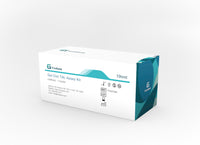
# Pyrogen Detection Kit: Essential Tools for Safe Pharmaceutical Production
## Introduction to Pyrogen Detection
Pyrogens are fever-inducing substances that can contaminate pharmaceutical products, medical devices, and parenteral solutions. These potentially dangerous compounds can originate from various sources, including bacterial endotoxins, viruses, fungi, or even certain chemicals. Ensuring pharmaceutical products are pyrogen-free is critical for patient safety and regulatory compliance.
## The Importance of Pyrogen Testing
Pharmaceutical manufacturers must rigorously test their products for pyrogens to:
– Prevent adverse reactions in patients
– Comply with strict regulatory requirements
– Maintain product quality and safety standards
– Protect brand reputation and avoid costly recalls
## Types of Pyrogen Detection Kits
Modern pyrogen detection kits utilize different methodologies to identify these harmful substances:
### 1. Limulus Amebocyte Lysate (LAL) Test Kits
The most widely used method, LAL tests detect bacterial endotoxins through a clotting reaction in horseshoe crab blood. Available formats include:
– Gel-clot assays
– Chromogenic assays
– Turbidimetric assays
### 2. Recombinant Factor C (rFC) Test Kits
An animal-free alternative that uses recombinant technology to detect endotoxins with similar sensitivity to LAL tests.
### 3. Monocyte Activation Test (MAT) Kits
These comprehensive kits can detect both endotoxin and non-endotoxin pyrogens by measuring cytokine release from human immune cells.
## Key Features of High-Quality Pyrogen Detection Kits
When selecting a pyrogen detection kit, consider these essential features:
– High sensitivity and specificity
– Broad detection range
– Compliance with pharmacopeial standards (USP, EP, JP)
– Rapid results with minimal sample preparation
– Stability and long shelf life
– Clear, easy-to-interpret results
## Applications in Pharmaceutical Manufacturing
Pyrogen detection kits play vital roles throughout the drug development and production process:
– Raw material testing
– In-process quality control
– Final product release testing
– Equipment and container validation
– Water system monitoring
## Regulatory Considerations
Pharmaceutical companies must ensure their pyrogen testing methods meet regulatory requirements:
– FDA 21 CFR requirements
– European Pharmacopoeia guidelines
– ICH quality guidelines
– Good Manufacturing Practice (GMP) standards
## Choosing the Right Pyrogen Detection Kit
Selecting the appropriate kit depends on several factors:
– Type of product being tested
– Required sensitivity level
– Sample matrix characteristics
– Throughput requirements
– Regulatory expectations
Keyword: Pyrogen Detection Kits
– Budget constraints
## Future Trends in Pyrogen Detection
The field continues to evolve with emerging technologies:
– Development of more sensitive and specific assays
– Increased adoption of animal-free testing methods
– Automation and high-throughput solutions
– Integration with quality control systems
## Conclusion
Pyrogen detection kits are indispensable tools for ensuring pharmaceutical safety. By implementing appropriate testing protocols with reliable detection kits, manufacturers can protect patients, comply with regulations, and maintain the highest quality standards in their products. As technology advances, these kits will continue to play a crucial role in safeguarding public health.
